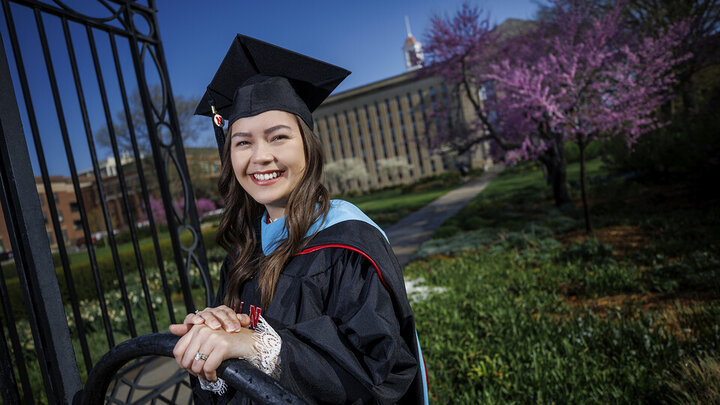Mentorship, both given and received, has been a hallmark of Kristlin Mogensen Bright’s academic experience.
Bright will be awarded her master’s degree in counseling psychology during University of Nebraska-Lincoln commencement ceremonies May 13. She will soon embark upon her career as a licensed psychotherapist in private practice.
While pursuing her master’s degree, she served as a graduate assistant for Educational Talent Search for TRIO Programs at the University of Nebraska-Lincoln. She visited each of Lincoln’s public high schools weekly to help eligible seniors with their college planning, nudging them to complete the Free Application for Federal Student Aid, reminding them to sign up for a college entrance exam, brainstorming over references and helping them compose scholarship essays.
Many of the students lack someone in their families who can show them the ropes about getting into college and succeeding after they arrive.
Bright’s life experience taught her how important it is for those students to have someone like her.
For example, her father was a good student. He was valedictorian and class president for his senior class who landed a full scholarship to college. But he dropped out in his first year and got a job. He has confided to her that if he’d had someone to help him, he might have been able to continue in college.
While she attended South Sioux City High School, Bright had a mentor through the TeamMates program founded by former Husker Coach and Athletic Director Tom Osborne. That mentor supported her in her journey to seek an education at all costs – even when it meant sacrificing social activities.
“It wasn’t that my parents weren’t taking an interest in my schooling, my dad really wanted us to get an education. But he was working three jobs and he didn’t have time,” she said. “I knew getting into college was my own responsibility.”
Her high school counselors, who knew her TeamMates mentor, helped her connect with the W.H. Thompson Scholars program, which combines a major scholarship through the Susan T. Buffett Foundation with an on-campus learning community. They helped her find other scholarships that paid virtually the full cost of her undergraduate degree.
“I didn’t know how much college costs — and I didn’t know how big scholarships could be,” she said.
Her boyfriend, now husband, Casey Bright, also gave her guidance. Both Kristlin and Casey graduated in the top 5% of their class at South Sioux City. The couple started dating when they were 15 and married in 2019.
“I asked him ‘what are you doing now,’ and he said, ‘writing scholarships,’” she recalled. “So I copied him.”
Kristlin and Casey married soon after their undergraduate commencement in May 2019. That August, they embarked upon a nine-month international trip, spending over three months in Europe, four months in Asia and a month in Australia. They had saved for the trip by working during college.
Bright decided during the trip that she would pursue her master’s degree. She took the Graduate Record Examinations while in France.
Mentors had helped her gain the undergraduate record she needed to be considered for graduate school.
As an undergraduate, she worked in Rebecca Brock’s Family Development Laboratory, as a result of advice she received from Alyssa Bischmann, her instructor for a third-year Educational Psychology class. Bischmann asked about her educational goals and told her she would need research and clinical experience even to be considered for graduate school.
“I would never have known that as a first-gen student and I didn’t have anyone close to me that I could have asked those questions,” Bright said. “She revealed assumptions that higher education has for students, such as students should know that they need to be in research before going to graduate school and that they need clinical experiences before being considered for graduate school.”
Later, as Bright prepared her graduate school applications, she turned to Bischmann again for help.
“She helped me write my personal statement in a way that would be appealing to faculty who read it,” Bright said. “I had no idea how to write it otherwise and I don’t think I would have gotten into graduate school if it weren’t for her guidance.”
Bright, who has served on the First Generation Nebraska advisory board, said she has been fortunate to have amazing mentors in her life.
“Academia can be sort of a secret language,” she said. “I’m lucky that I am the type of person who asks questions to anyone who will listen, but that is not the case for all first-gens. I think it highlights the importance of first-gen programs and their work to reach and support first-gen students.”
College of Education and Human Sciences
Educational Psychology




